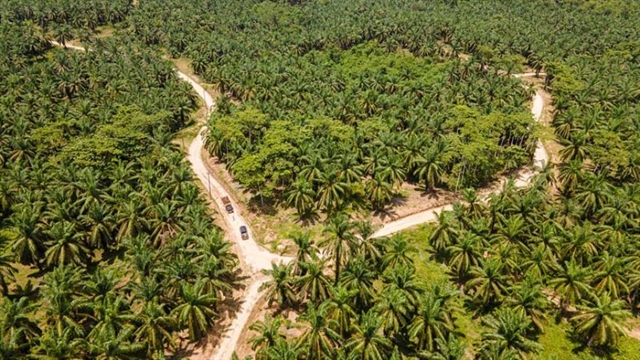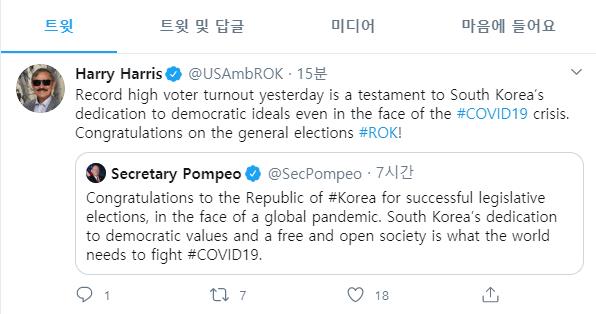 World
World


|
| This photo, captured from the Twitter account of US Ambassador to Seoul Harry Harris on April 16, 2020, shows his post congratulating South Korea on its successful general elections held the previous day amid the new coronavirus crisis. — YONHAP/VNA Photo |
SEOUL — The ruling Democratic Party (DP) clinched a landslide victory in parliamentary elections, according to preliminary election results released on Thursday, as voters apparently supported the government's efforts to overcome the new coronavirus crisis.
South Korea held the quadrennial elections on Wednesday to fill the 300-member unicameral National Assembly – with 253 directly contested seats and 47 proportional representation (PR) slots – in the midst of the country's battle against the COVID-19 pandemic.
The ruling DP and its satellite Platform Party targeting the PR slots are forecast to secure 180 seats, three-fifths of the total. The main opposition United Future Party (UFP) and its sister party are likely to win 103 posts.
The ruling party succeeded in winning a majority of parliamentary seats for the first time in 16 years.
With 99.3 per cent of the votes for the directly contested seats counted, the National Election Commission (NEC) said the DP took the lead in 163 constituencies across the nation, followed by the conservative UFP, with 84 districts.
With 92.7 per cent of the votes for PR seats counted, the Korea Future Party, the UFP's satellite party targeting the slots earned 19 seats, followed by the DP's Platform Party with 17 seats. The final results were anticipated later in the day.
South Korea's elections have been closely watched from overseas as the country became the first major country to hold nationwide polls since the COVID-19 crisis began sweeping the globe.
The elections were widely seen as a referendum on President Moon Jae-in, who is now in his third year in office after being elected in May 2017.
Moon's approval rate fell to the 30 percent level at one point last year, hit by a prolonged economic slowdown and a political scandal involving former Justice Minister Cho Kuk.
But the government's handling of the coronavirus crisis has changed public sentiment, illustrated in recent polls in which Moon's approval rating shot up to over 50 percent.
South Korea has reported a caseload of nearly 10,600 since its first infection on Jan. 20. It recorded fewer than 30 new virus cases for the third straight day on Wednesday.
The DP's victory will enable Moon to manage state affairs stably during the rest of his single, five-year term. It will prop up Moon's reform initiatives, including the reform of prosecutors.
The ruling party pledged to focus on tackling the virus outbreak and minimize its fallout on the economy.
"We will do our best to overcome war against the coronavirus and the economic crisis so as to reward people's support for us," DP chairman Lee Hae-chan said.
When the ruling bloc controls at least 180 seats, it is able to pass most bills despite objections from the UFP.
The sprawling ruling bloc could pass almost all legislation, except for a motion to revise the Constitution, which requires the approval of 200 lawmakers.
In the foreseeable future, the DP will be able to swiftly pass a proposed extra budget to finance the government's emergency relief funds over the coronavirus.
Former Prime Minister Lee Nak-yon of the DP won against Hwang Kyo-ahn, chief of the UFP, in the Jongno district in central Seoul, a symbolic constituency in Korean politics.
Their race drew intense public attention as they are widely viewed as potential presidential candidates.
Meanwhile, the UFP suffered its third straight defeat in elections, including in the 2018 local polls, since the 2017 ouster of former President Park Geun-hye over a corruption scandal.
The conservative party failed to win over voters, though it highlighted the government's failure to prop up the economy and stressed the need to keep the DP in check.
Hwang resigned from the party chairmanship to take responsibility for his party's defeat.
Voter turnout in the elections tentatively came in at 66.2 per cent, the highest in 28 years, according to the NEC. Turnout in early voting also hit a record 26.69 per cent.
The election watchdog prioritised bolstering voter safety to prevent people's potential exposure to the risk of infection.
Voters wearing face masks had their temperatures checked at the entrance. They disinfected their hands with sanitizers and put on plastic gloves before casting ballots. To keep social distancing rules, voters were advised to stand at least 1 meter apart from others.
The general elections were conducted under the new electoral reform bill that was passed in December. The new rules called for adopting a mixed-member PR scheme and lowering the voting age to 18.
The new PR system could have worked favorably for minor parties, as the method of distributing PR seats was supposed to better reflect cast for parties.
But smaller parties' aspiration to clinch more parliamentary seats fell through as the two largest parties' creation of satellite parties targeting PR seats undermined the intent of the scheme.
The longest-ever ballots of 48.1 centimeters were used for PR voting, as the number of parties targeting the slots reached a record 35. The ballots were counted manually for the first time in 18 years. — YONHAP




